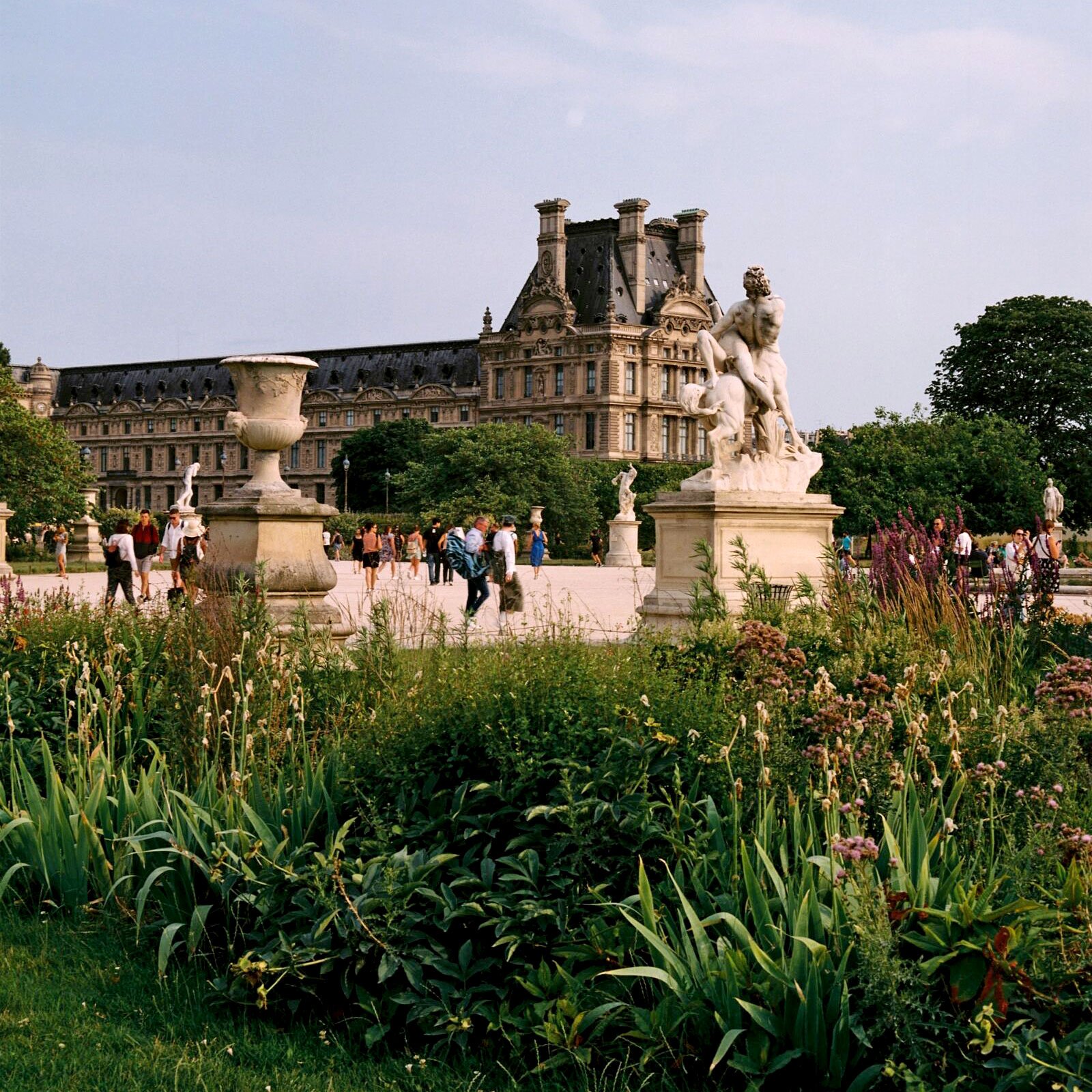
This week, art connoisseurs from across the globe will touch down in the City of Lights for the second edition of the fair Paris+, by Art Basel. While selling is the backbone of the event, the fair has also taken advantage of the city’s legendary environs to stage public exhibitions and events.
Among the more arresting will be a show titled “La Cinquième Saison” (The Fifth Season), taking place at the iconic Jardin des Tuileries in the heart of the city. Presented by Art Basel in collaboration with the Louvre, the show is curated by Annabelle Ténèze, director of the Louvre-Lens Museum, for the second year in a row. It brings together some 25 artworks placed among the fountains and pathways of the park, creating a pop-up sculpture garden with a distinctly global purview.
“In the city, we live with animals, birds, insects, rocks, but we don’t consider them,” Ténèze told the New York Times. “The idea of the fifth season is to look at what is so marvelous around us.”
“Last year, many of the projects questioned the form of art in public space,” Tenèze told Art Basel. “This raised the question of who expresses themselves in the public space and, in turn, who doesn’t. I’m very interested in these reflections.
“Among the various proposals I’ve received this year, several works question what it means to live and inhabit the world today, whether as an animal or a human being, on a planet that is dramatically changing,” she added. “Water is present on several occasions, including in projects not intended for ponds.”
Meriem Bennani
Meriem Bennani, Windy (2022). Courtesy of the artist, High Line and Audemars Piguet, and CLEARING.
© Meriem Bennani
Moroccan artist Meriem Bennani’s work grapples with life in the modern age, and the ways in which culture, community, and technology collide, all rendered with a mischievous eye and an interest in pop and consumer culture. This work, made from motorized foam disks, plays with ideas of living in a three-dimensional world but being consumed by two-dimensional imagery. First commissioned by the High Line in New York, the work’s frenetic swirl evokes the anxieties of living in the age of technology.
Claudia Comte
Claudia Comte, Five Marble Leaves, 2023. Presented by Albarrán Bourdais (Madrid). Courtesy of the artist and Albarrán Bourdais.
Created expressly for the Jardin des Tuileries, this sculptural installation formally refers to the trees that surround it in the garden while also alluding to the perils of climate change. The leaves refer to both death and rebirth; the sculptures’ material, sturdy and long-lasting marble, alludes to the hardiness of trees but also, by contrast, to their fragility. Through site-specific installations, painting and sculpture, often using organic forms like trees, leaves, and cacti, Comte brings together traditional hand-working processes for making objects with modern industrial and mechanical methods.
Tony Cragg
Tony Cragg, Willow (2014). Presented by Buchmann Galerie. Courtesy of Paris+ par Art Basel
Before pursuing art, German-English sculptor Tony Cragg worked in a biochemistry lab, and his work today builds upon that background, looking to push the limits of materials by making structures that feel organic in nature. The undulating, cocooning form of Willow continues on in that tradition, taking inspiration from a willow tree that stands outside the home where he spends his summers in Sweden. Despite being made from heavy, immovable bronze, Cragg imbues the sculpture with a softness and a sense of movement—the very contrasts that have informed much of his career.
General Idea
General Idea, AIDS Sculpture (1989-2023). Presented by Esther Schipper, Mitchell-Innes & Nash, Mai 36 Galerie, and Maureen Paley. Courtesy of Paris+ par Art Basel
Acting under the moniker General Idea, Canadian artists AA Bronson, Felix Partz, and Jorge Zontal banded together in 1969 and spent the next quarter-century creating works across a variety of mediums. This work, created for the 1987 Art Against AIDS benefit, takes Robert Indiana’s famous sculpture LOVE (1966) and modifies the letters to read “AIDS,” raising awareness of a disease that was then devastating the art community. Graffiti and other markings it gathers over time become part of the piece—showing how public art is in constant dialogue with the world around it.
Nicène Kossentini
Nicène Kossentini, The Butterfly, 2014. Presented by Selma Feriani Gallery, (Tunis, London). Courtesy of Selma Feriani Gallery and the artist.
Made from resin, fiberglass, and a Japanese textile, this oversized butterfly not only highlights the delicacy and ephemerality of nature but also brings light to the ways humans and nature interact. Kossentini, a Tunisian artist, is known for work focusing on our relationship with our environment. Here, the grounded butterfly evokes both the freedom of flight and its dangers, referring to Icarus, whose wings melted when he flew too close to the sun. Additionally, butterflies at once are perceived as light, joyful creatures that symbolize transformation but also an example of the dangers of climate change, since Monarch butterflies are currently endangered.
Zanele Muholi
Zanele Muholi, The Politics of Black Silhouettes, 2023. Presented by Galerie Carole Kvasnevski
Courtesy of Paris+ par Art Basel.
Self-declared “visual activist” Zanele Muholi has achieved worldwide acclaim for their photography lionizing the LGBTQIA+ community of South Africa through portraiture created in the face of brutality and state persecution. Now they have turned to self-portraiture and to sculpture; the works in the Tuileries depict the artist in dialogue with the historical, more martial-themed sculptures placed in the park. Presented without a pedestal, they show the artist seated, restrained, or even sleeping or merging with the earth.